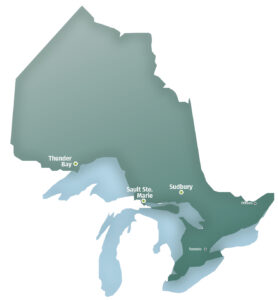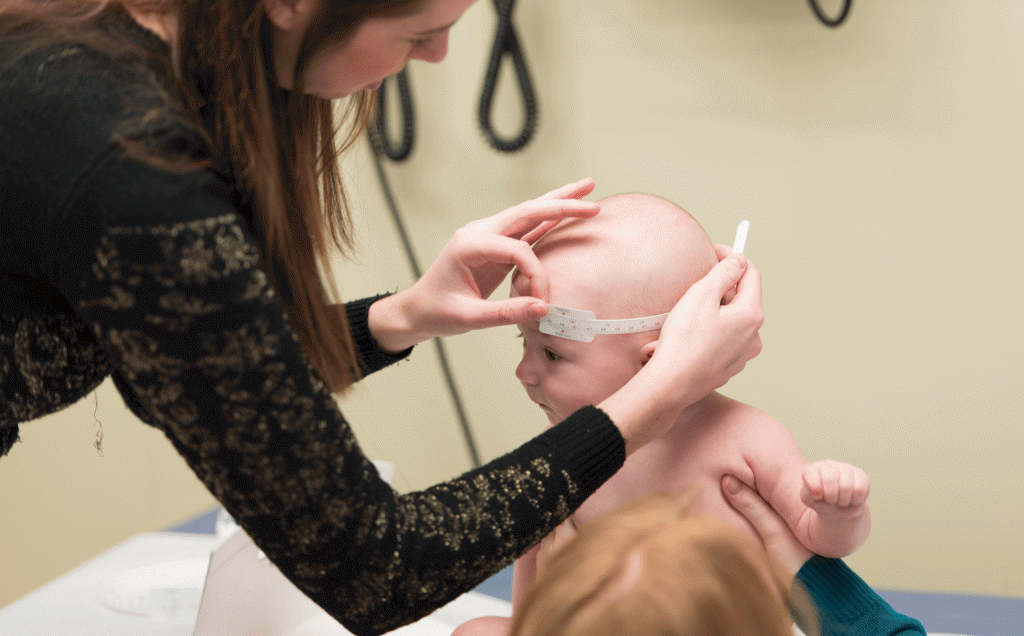About the Dietetic Practicum Program

Program Overview
The Northern Ontario Dietetic Internship Program (DPP) has been renamed the NOSM University Dietetic Practicum Program (DPP). While the name has changed, the quality and integrity of the program remain exceptional. The DPP offers a wide range of opportunities for learning and professional development in the field of dietetics. Read more about the program’s name change.
The Dietetic Practicum Program is administered in collaboration with multiple preceptors, communities, and facilities throughout Northern Ontario. A nationally accredited professional program, DPP provides practical, hands-on dietetic experience that enables students to obtain the Integrated Competencies For Dietetic Education and Practice required of an entry-level Registered Dietitian.
NOSM University’s social accountability mandate and a commitment to community-engaged and distributed learning is the foundation of its program.
We provide opportunities for students to work in small communities and large hospital centres, enabling them to understand the nuances and challenges of dietetics, food insecurity and nutrition for various population groups. Learners will be supported by dedicated staff members, colleagues, and dietetics practitioners in our communities.
The Dietetic Practicum Program (DPP) facilitates self-directed learning and provides progressive training opportunities to attain professional competence. The practicum is a comprehensive 46-week program in which learners are exposed to nutrition care, population health promotion, food provision and management roles in dietetics. Following graduation, learners are eligible to apply for a temporary license with a provincial regulatory body and write the Canadian Dietetic Registration Exam.
NOSM University offers a wide range of challenging learning experiences in a variety of practice settings including:
- Regional Tertiary Care Hospitals
- Family Health Teams
- Public Health Units
- Community Health Centres
- Long-Term Care Facilities
- Rural Community Hospitals
- Indigenous or Francophone communities and organizations
Our Dietetic Practicum Leads collaborate with each learner to individualize and coordinate your schedule to balance professional interests and learning needs with placement availability. The DPP program enables you to develop the unique skills required to meet the growing demand for dietetic health professionals in Northern Ontario and beyond.
 Up to 12 successful applicants will be selected annually.
Up to 12 successful applicants will be selected annually.
Beginning in September each year, learners will live and practise in one of three primary sites:
- Thunder Bay
- Sault Ste. Marie
- Sudbury
Applications to the Dietetic Practicum Program are submitted directly to NOSM University.
Please refer to the Application & Selection Process for more details.
Program Outline
Orientation /Professional Development: 2 weeks
Food Provision and Management: 6 weeks
Nutrition Care: ~20 weeks
Population and Health Promotion: ~10 weeks
Practice-Based Project: 4 weeks
Consolidation: 2-3 weeks
Vacation: 2 weeks
Total (including vacation): 46 weeks
A minimum four to six-week rural placement is required for this program. NOSM University arranges housing for you, with the cost of accommodations being covered by DPP. Mileage reimbursement is available for travel to and from these rural placements.
Dietetics Rotations & Placements
A variety of rotations/placements are available for each component of the program. Below are examples; exact placements cannot be guaranteed and may change from year to year.
Food Provision and Management
- Food service operations in a hospital or long-term care facility
- Human resources management
- Working in a unionized environment
- Project management
Outpatient Clinical Care
- Regional bariatric assessment centres
- Cancer centres
- Cardiac rehabilitation
- Diabetes programs
- Family health teams
Inpatient Clinical Care
- Medicine
- Rehabilitation
- Long-term care
- Oncology
- Surgery
- Renal Care
- Critical care
- Pediatrics
Population Health Promotion
- Public health units
- Aboriginal Health Access Centres
- Indigenous Services Canada, First Nations and Inuit Health Branch
- Family health teams
- Community health centres
Practice-Based Dietetic Research Projects
The purpose of the project is to provide learners with a foundation and introductory experience in collaborative practice-based dietetic research and evaluation. This project can take place in the clinical, community, and food service/industry settings.
Topics are submitted annually by RD preceptors from the various DPP placement sites. Two dietetic learners are paired and then assigned to a project, which is completed over the practicum year, including four scheduled research weeks.
Professional Development and DPP Resources
NOSM University provides a host of professional development opportunities including online and self-paced coursework (e.g. cultural sensitivity training, behaviour change counselling) and an annual calendar of academic seminars and workshops on topics including research methods, program evaluation, eating disorders, paediatric growth assessment, renal disease, sustainable food systems, communication, Nutrition Care Process, and more.
DPP SharePoint Site
As a distributed learning program, the DPP SharePoint site is the primary tool for communication. The site includes:
- Placement information, rotation descriptions, and evaluation forms.
- Study guides, project, and assignment guidelines.
- Professional development schedule and preparatory workshop materials.
- A Resource Centre of learner support information, policies, procedures, and more.
Shown below: DPP learner practicing head circumference measurement during the Paediatric Growth Assessment Workshop.

Practicum Requirements
To be successful in a full-time, comprehensive practicum, learners need to be self-directed and organized. Learners are expected to follow NOSM University and DPP policies, attend mandatory orientation and professional development sessions, and complete all projects, assignments, coursework, and documentation for each placement. Reliable access to a vehicle is required to complete placements, especially for locations outside of your primary sites.
Placements are completed with partner sites that set several health and non-health and safety requirements that learners will need to meet before beginning placements, these include:
- Immunizations, including COVID-19 and Influenza vaccines
- Recent police vulnerable sector check
- N95 mask fit testing
- Professional association and liability insurance
- Health, safety, and privacy modules
- Food Safety certification
NOSM University Dietetic Placement Communities
The walls of NOSM University are the boundaries of Northern Ontario that span thousands of kilometres and include urban and rural centres, Indigenous, and Francophone communities. Beyond placements occurring in the principal sites of Thunder Bay, Sault Ste. Marie, and Sudbury, learners will complete placements in the regional communities surrounding each of these cities. The representative selection below profiles a site’s location, history, economy, and health and education resources.
Nutrition in the North Newsletter
Past Issues
2024-25
2023-24
2022-23
2021-22
2020-21
2019-20
NOSM University Dietetic Program Accreditation
 This dietetic education program is accredited with Accreditation Canada/EQual and prepares learners for eligibility for registration with a provincial dietetics regulatory body. Graduates are eligible to write the Canadian Dietetic Registration Exam and if successful, become Registered Dietitians.
This dietetic education program is accredited with Accreditation Canada/EQual and prepares learners for eligibility for registration with a provincial dietetics regulatory body. Graduates are eligible to write the Canadian Dietetic Registration Exam and if successful, become Registered Dietitians.
An accredited status serves as an important demonstration of NOSM University’s commitment to providing quality education in alignment with accreditation and regulatory requirements.
If you require additional information regarding the accreditation status and/or any potential implications this accreditation status may have on your future abilities to practise as a Registered Dietitian, we encourage you to reach out to the Manager, Dietetics:
Cara Green, MHS, RD
Assistant Professor, NOSM University
955 Oliver Road, Thunder Bay, ON, P7B 5E1
Email: dpp@nosm.ca



